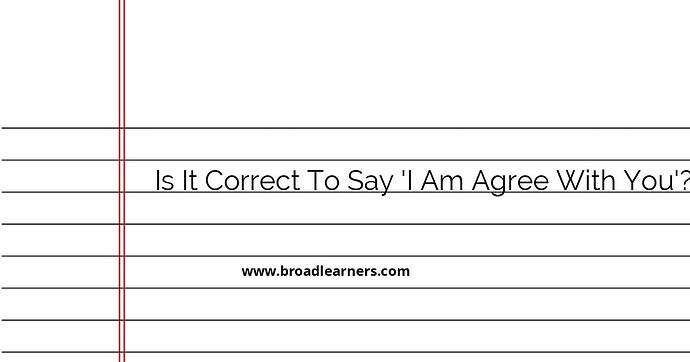The phrase 'I am agree with you' is incorrect in English grammar. The correct expression is 'I agree with you.' Let's delve into a detailed explanation of why 'I am agree with you' is incorrect, followed by some suggested alternatives and examples to help you understand how to express agreement correctly.
- Explanation:
In English grammar, 'agree' is a verb. When forming sentences, especially with verbs, it is crucial to understand whether the verb is a main verb, auxiliary verb, or part of a specific verb tense. The phrase 'I am agree with you' incorrectly combines the use of the verb 'to be' with another verb, 'agree,' in its base form. This is akin to saying 'I am eat' instead of 'I eat.'
Here are some detailed points on this:
- Verb Form: 'Agree' is used as the main verb and does not require an auxiliary verb when used in the present simple tense. This is why 'I agree' is correct. In contrast, 'I am agree' mistakenly uses 'am,' which is unnecessary.
- Sentence Structure: When stating simple agreement, the structure is 'Subject + Verb + Object'. For agreement, the verb is 'agree,' hence the phrase becomes 'I agree with you.'
Suggested Alternatives:
Here are a few ways to express concurrence or agreement along with detailed examples:
- 'I agree with you.' – This is the correct and straightforward way to express agreement.
- 'I am in agreement with you.' – This alternative uses the noun form 'agreement' and is equally valid.
- 'I concur.' – This is a more formal expression often used in professional or academic settings.
Let's explore each alternative with examples:
1. 'I agree with you.'
Example:
Person A: I think implementing this strategy will improve our productivity.
Person B: I agree with you. This approach seems promising.
2. 'I am in agreement with you.'
Example:
Person A: The new policy aligns perfectly with our goals.
Person B: I am in agreement with you. It reflects our core values.
3. 'I concur.'
Example:
Person A: The data supports our hypothesis that customer engagement will increase.
Person B: I concur. The evidence is quite compelling.
In summary, while 'I am agree with you' is incorrect, there are several correct and context-appropriate ways to express agreement. By understanding the grammar rules and using the right phrases, you can ensure clear and accurate communication.
Did I miss anything? Respond below
